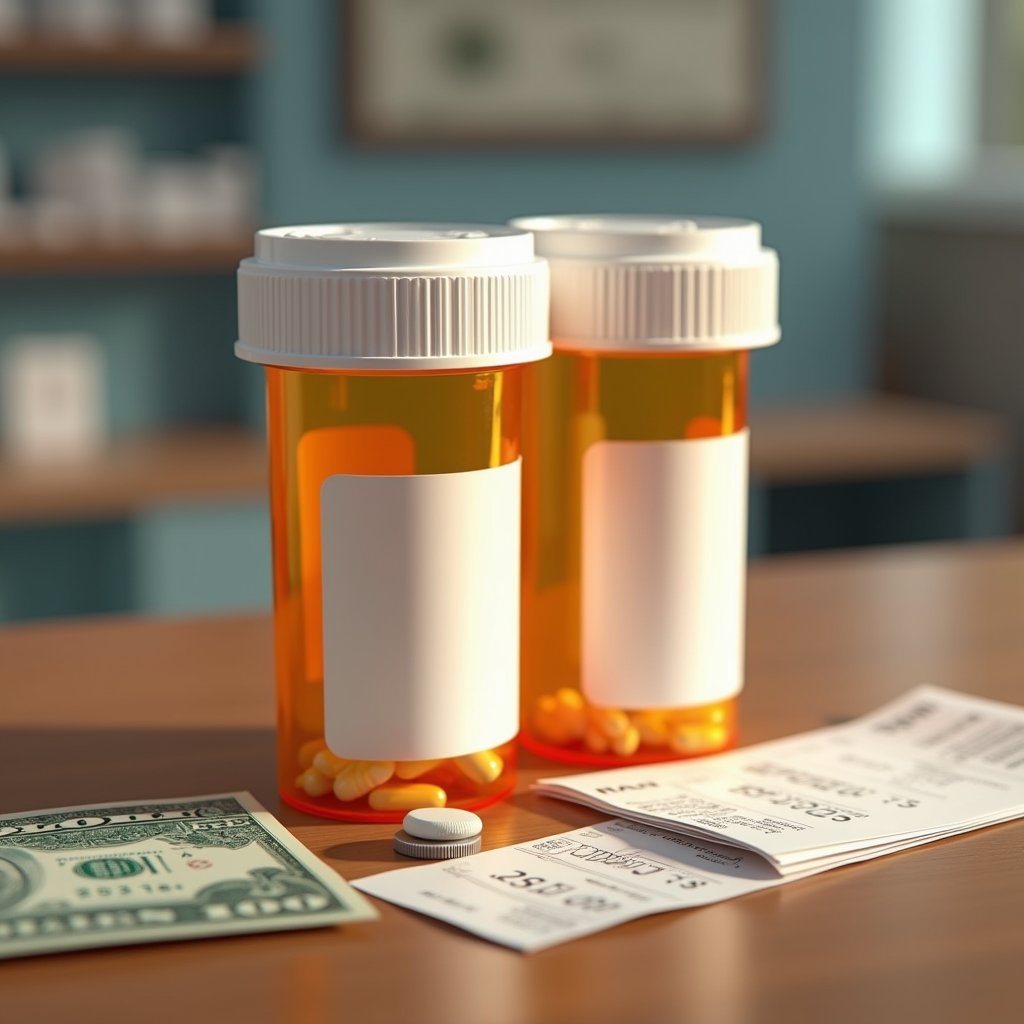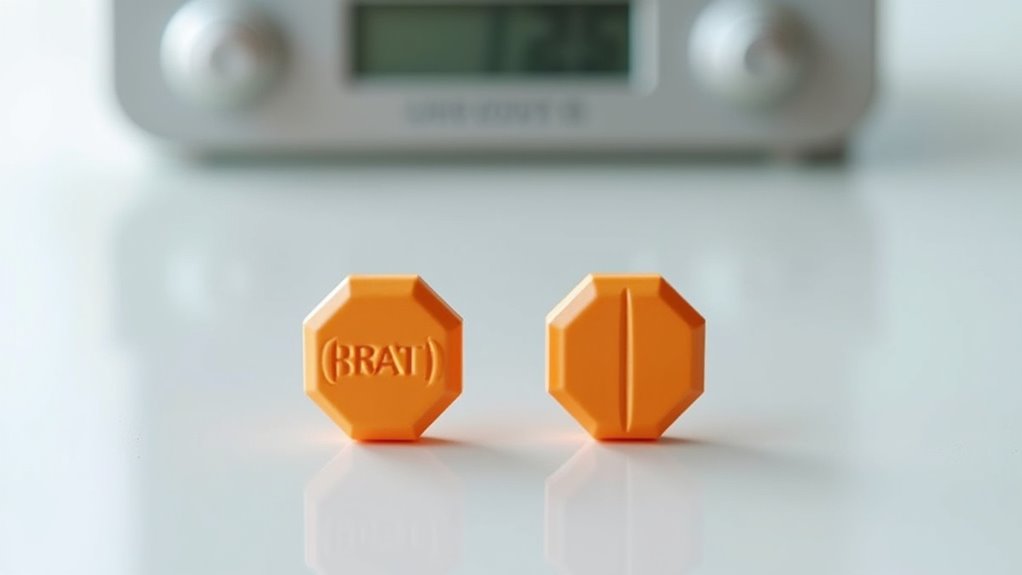Generic Suboxone versions cost 50% less than brand-name options, with monthly supplies starting at $30-$40 compared to $35-$186 for brand-name films. You’ll find identical active ingredients (buprenorphine and naloxone) and FDA-regulated quality standards in both versions. Most insurance plans cover generics more readily, though prior authorization may be required. While both formulations effectively treat opioid withdrawal, understanding key pricing factors can help optimize your treatment budget.
Breaking Down the Price Gap: Generic vs. Brand-Name Suboxone

While brand-name Suboxone remains a popular choice for medication-assisted treatment, generic alternatives offer substantial cost savings for patients managing opioid dependence. From a patient perspective, you’ll find generic versions typically cost 50% less than brand-name options, with monthly supplies starting at $30-$40 for 30 films compared to $35-$186 for brand Suboxone. Most Medicare and insurance plans provide coverage for generic buprenorphine/naloxone options. The medication should be taken as a sublingual tablet or film for proper absorption and effectiveness.
Your physician’s prescribing behavior may influence costs, particularly when selecting dosage strengths and delivery forms. Higher-dose generics (8mg/2mg) can range from $68-$540 monthly, though they still maintain cost advantages over brand equivalents. The form prescribed whether film or tablet impacts pricing, with films commanding premium prices due to specialized manufacturing requirements. Prior authorization may be required by insurance providers before covering any version of the medication. Understanding these price differences helps you make informed decisions about your treatment options while managing costs effectively.
Understanding Active Ingredients and Quality Standards

Although patients often question whether generic Suboxone matches the quality of its brand-name counterpart, both formulations contain identical active ingredients buprenorphine and naloxone in the same precise dosages. You’ll find that medication purity standards are equally comparable for both versions, with FDA-mandated testing ensuring formulation stability across their shelf life. Both medications effectively help patients manage opioid withdrawal symptoms when taken as prescribed. Both versions are available in dissolving film strips, providing convenient administration options for patients. Patients can expect to see significant cost savings when choosing the generic version over brand-name Suboxone.
| Quality Measure | Generic Suboxone | Brand Suboxone |
|---|---|---|
| Active Components | Buprenorphine/Naloxone | Buprenorphine/Naloxone |
| Manufacturing Standards | FDA-regulated | FDA-regulated |
| Bioequivalence Testing | Required | Benchmark |
The FDA requires generic manufacturers to demonstrate consistent production processes and conduct rigorous stability testing. You can trust that both versions undergo identical quality control measures, maintaining therapeutic equivalence throughout treatment. Each formulation must meet the same strict regulatory criteria for safety and efficacy.
Available Forms and Accessibility at Local Pharmacies

Patients seeking Suboxone treatment can access both brand-name films and generic alternatives at most local pharmacies. You’ll find manufacturer-specific offerings from companies like Dr. Reddy’s, Alvogen, and Aveva, with each providing their own film formulations that match Suboxone’s dosage strengths. This allows for equivalent dosing effectiveness between brand and generic versions.
When comparing options, you’ll notice visual and tactile differences between products. The medication strength is always identifiable by the white imprinted numbers on each strip. Generic films may appear in diverse colors, unlike Suboxone’s white/orange appearance. Other available formulations like sublingual tablets include Zubsolv, which provides another treatment option. Dr. Reddy’s version features a distinct lemon-lime flavor, contrasting with Suboxone’s traditional peppermint taste. While brand-name Suboxone is exclusively available as films, some generic versions come in tablet form. Your pharmacist can typically stock multiple options, though film formulations have become increasingly dominant in the market, potentially limiting tablet availability at some locations.
Insurance Coverage and Formulary Considerations
Understanding insurance coverage for Suboxone requires careful consideration of formulary status and plan-specific requirements. You’ll find generic buprenorphine/naloxone widely covered by Medicare and private insurers, while brand-name versions often face formulary inclusion effects that limit accessibility. Prior authorization process challenges can affect both versions, though they’re typically more stringent for brand-name prescriptions. Major providers like Aetna and TRICARE consistently offer coverage options for both versions of the medication. Nearly all Medicare drug plans provide Tier 1 coverage for buprenorphine/naloxone prescriptions.
| Coverage Factor | Generic Suboxone | Brand Suboxone |
|---|---|---|
| Insurance Acceptance | Widely covered | Limited coverage |
| Prior Authorization | Sometimes required | Usually required |
| Typical Copays | $0-30 | $150+ |
| Medicare Part D | Generally included | Often excluded |
| Formulary Status | Preferred tier | Non-preferred/excluded |
When navigating through insurance coverage, you’ll need to verify your plan’s specific requirements and coordinate with your healthcare provider to fulfill proper authorization. Generic versions typically offer more straightforward coverage pathways and lower out-of-pocket costs.
Research and Development Impact on Medication Costs
You’ll find that brand-name drug prices reflect substantial research and development investments, with companies like Suboxone’s manufacturer requiring extended market exclusivity to recover their costs. Patents protect these investments by preventing generic competition for set periods, allowing pharmaceutical companies to maintain premium pricing during this time.
The significant upfront expenses of clinical trials and regulatory approvals directly contribute to Suboxone’s higher brand cost of $170 per month compared to generic versions at $51. Most insurance plans and Medicare Part D provide coverage options to help offset these costs. Patients paying out-of-pocket face steep daily costs averaging $8.44 without insurance coverage. Eligible patients can access patient assistance programs that offer discounted or free medication to those meeting specific income criteria.
Patent Protection Drives Pricing
The complex interplay between patent protection and pharmaceutical pricing becomes evident when examining Suboxone’s cost structure. You’ll find that multiple U.S. patents extending through 2030 allow the brand manufacturer to maintain premium pricing, while pharmaceutical litigation from companies like TeA Pharmaceuticals challenges this market dominance.
The manufacturer’s global expansion plans are affected by varying patent expiration dates across different countries, with protection timelines differing considerably between U.S. and international markets. The U.S. market has seen a significant shift since generic versions launched in 2013. You’ll notice that patent “evergreening” strategies, including new formulation patents and delivery mechanisms, help maintain higher pricing.
When generics eventually enter the market after patent expiration, you can expect price reductions of 30-90%, though this depends on successful navigation of remaining patent challenges and regulatory approvals.
Research Investment Recovery Methods
Investment recovery shapes the stark price differential between brand-name and generic Suboxone versions. You’ll find that pharmaceutical companies invest billions in research, clinical trials, and regulatory approvals before a drug reaches the market. Without government funding considerations offsetting these costs, manufacturers must recoup their investments through premium pricing during their patent exclusivity period.
Marketing expense impacts also contribute extensively to brand-name costs, as companies promote their products to healthcare providers and patients. You’re seeing this reflected in Suboxone’s pricing structure, where brand-name strips cost about $150 per month compared to $40 for generics. Generic manufacturers don’t shoulder these research and marketing burdens, allowing them to offer substantially lower prices while maintaining profitability. They simply prove bioequivalence to the original drug, avoiding the extensive development costs of their brand-name counterparts.
Savings Opportunities Through Generic Alternatives
When comparing pharmacy prices, you’ll find generic buprenorphine/naloxone offers substantial savings of 50-70% over brand-name Suboxone, with costs dropping from approximately $170 to $51.26 for a 30-day supply. Your insurance coverage can further reduce out-of-pocket expenses through lower copays for generic alternatives, and many insurers prioritize generic versions in their formularies.
You can optimize savings by utilizing pharmacy discount programs like GoodRx or SingleCare, which can lower generic costs to as little as $35.48 for a two-week supply.
Pharmacy Price Comparison Data
Significant price variations exist between brand-name Suboxone and its generic alternatives across major pharmacy chains, with monthly costs ranging from $30 to $540 depending on dosage and location. For uninsured patients, generic versions offer substantial savings, with prices averaging $40.72 without discounts.
Seasonal pricing changes can affect availability and costs at different pharmacies throughout the year.
- CVS charges $186.78 for brand Suboxone, while generic versions with SingleCare cost $93.70
- Walmart’s pricing starts at $226.63 for brand versions, with limited discount options
- Kroger offers generic films at $92.23 with SingleCare, down from $295.71
- Walgreens provides generic options at $110.69 with discount cards, representing significant savings compared to brand-name versions
Insurance Coverage Benefits
Insurance coverage for Suboxone offers substantial cost-reduction opportunities through generic alternatives, with major insurers like Aetna, BCBS, and UnitedHealth Group typically placing generic buprenorphine/naloxone in lower formulary tiers. You’ll find fewer treatment access barriers with generics, as they often bypass prior authorization requirements that can delay care.
| Coverage Element | Brand Suboxone | Generic Version |
|---|---|---|
| Prior Auth | Required | Rarely needed |
| Tier Placement | Higher tier | Lower tier |
| Plan Limitations | More strict | More flexible |
| Copay Range | $30-100+ | $5-20 |
| Access Speed | Delayed | Immediate |
Your insurance benefits optimize savings when you opt for generic versions, as most plans structure their formularies to encourage generic use through lower copays and fewer restrictions.
Cost-Saving Program Options
Patients consistently find substantial savings through generic Suboxone alternatives, with retail prices averaging $40 for a month’s supply compared to $150 for brand-name versions. Beyond generic options, you’ll find additional cost-saving opportunities through copay assistance programs and financial aid opportunities that can further reduce your treatment expenses.
Compare prices across major pharmacy chains, as Walgreens and CVS often offer more competitive pricing than other retailers.
Consider tablet formulations instead of films, as they’re typically more affordable while containing identical active ingredients.
Discuss lower-dose options with your provider when clinically appropriate, as 0.5-2 mg tablets cost considerably less than higher doses.
Investigate manufacturer-sponsored financial aid opportunities that can help offset remaining out-of-pocket expenses after insurance coverage.
Market Competition and Price Fluctuations
Three key factors drive market competition and price fluctuations in the Suboxone marketplace: generic availability, pharmacy-specific pricing strategies, and discount programs. You’ll find that supply chain disruptions and regulatory requirements can considerably impact pricing stability across both generic and brand-name versions.
| Pharmacy | Generic Price | Brand Price |
|---|---|---|
| CVS | $93.70 | $170.00 |
| Kroger | $92.23 | $170.00 |
| Local | $35.48 | $170.00 |
When comparing costs, you’ll notice price variations of 30-50% between generic and brand options. These differences stem from manufacturer competition and pharmacy-specific discounting strategies. While brand Suboxone films maintain relatively stable pricing at around $170 for 30 films, generic versions show greater price flexibility, ranging from $35.48 to $93.70 depending on your chosen pharmacy and available discount programs.
Pharmacy-Specific Pricing and Regional Variations
You’ll find significant cost variations for Suboxone between major pharmacy chains and independent pharmacies, with chains like CVS and Kroger offering deeper discounts through programs like SingleCare compared to smaller pharmacies.
Your location plays a pivotal role in pricing, as urban pharmacies typically provide more competitive rates and discount options than their rural counterparts.
When comparing costs across different regions, you’ll notice that warehouse chains like Walmart maintain consistent base pricing but may lack the same discount opportunities available at other major retailers.
Chain Vs Independent Costs
The cost differences between chain and independent pharmacies for Suboxone reveal distinct pricing patterns and regional variations. When comparing specialty pharmacies, you’ll find that chains like CVS and Walgreens offer more predictable pricing structures, with out-of-pocket costs ranging from $93-$110 with coupons. Independent pharmacies typically start with higher base prices but may provide more flexibility in negotiating costs.
Chain pharmacies consistently offer lower retail prices, with Kroger showing particularly aggressive discounts (up to 69% off retail)
Independent pharmacies charge higher base rates but may negotiate better deals for cash-paying customers
Urban locations typically maintain more competitive pricing than rural independent pharmacies
Insurance coverage often favors chain pharmacies, potentially limiting access to independent pharmacy services
Location-Based Price Trends
Substantial price variations exist across major pharmacy chains for both generic and brand-name Suboxone, with CVS and Walgreens offering the lowest retail prices at approximately $187. In contrast, Rite Aid’s retail price tops $301, while Kroger charges $295.71, highlighting notable inter-chain disparities.
Geographic location profoundly impacts these prices due to transportation costs and demographic trends. Urban areas typically offer more competitive pricing due to higher pharmacy density and market competition. Rural locations often face higher costs due to limited accessibility and distribution challenges.
Your location’s insurance coverage policies and local supply-demand dynamics also influence final pricing. For instance, while SingleCare discount programs can reduce CVS prices by 50%, program effectiveness varies by region, making it essential to research available options in your specific area.
Patent Protection and Generic Market Entry
While multiple patents shield Suboxone from generic competition, their complex web of protections encompasses diverse formulations and delivery methods that affect market entry timing. Litigation timelines and patent reassignments have created a shifting scenery, impacting when you’ll see affordable alternatives in the market.
Complex patent protections and ongoing litigation continue to shape when affordable Suboxone alternatives become available to patients.
Various legal challenges and regulatory decisions continue shaping generic availability across different dosage strengths.
- Original 2002 buprenorphine approval faced multiple patent extensions through new formulation protections
- Paragraph IV challenges targeting key patents have accelerated potential generic entry timelines
- FDA’s exclusivity period adjustments, especially for 12mg/3mg strength, altered competitive terrains
- Loss of 180-day exclusivity for certain strengths has reduced generic manufacturer incentives
You’ll find that successful patent challenges and exclusivity forfeitures are gradually opening doors for more affordable treatment options.
Real Cost Analysis: Monthly Treatment Expenses
Monthly treatment expenses for Suboxone stack up dramatically between brand-name and generic versions, with cost differences ranging from 3 to 6 times higher for brand medications. You’ll find brand-name Suboxone costs between $170-$301 without discounts, while generic versions start at just $51.26 for lower doses.
To address affordability challenges, you can utilize payment assistance options like GoodRx or SingleCare, which reduce brand-name costs to $93.70-$110.69 at major pharmacies. Generic versions become even more affordable with these discounts, dropping to $35.44-$68.91 depending on dosage strength.
If you’re uninsured, you’ll pay around $40.72 for low-dose generic films, though higher doses will increase your expenses. For ideal savings, combining generic versions with pharmacy discount programs offers the most cost-effective treatment approach.
Frequently Asked Questions
Can I Switch Between Generic and Brand Suboxone During Ongoing Treatment?
Yes, you can switch between generic and brand Suboxone during treatment since they’re FDA-approved bioequivalents. However, you’ll need your doctor’s authorization before switching between versions.
While both contain the same active ingredients, you may require dosage adjustments if you experience any withdrawal symptoms or breakthrough cravings. Be sure to report any side effects to your healthcare provider, who’ll monitor your response and adjust your treatment plan accordingly.
How Long Does It Take for Generic Suboxone to Start Working?
You’ll typically feel generic Suboxone’s initial effects within 20-60 minutes after taking your dose, with peak effectiveness occurring 2-3 hours later. The absorption rate depends on proper sublingual or buccal administration holding the medication under your tongue or against your cheek until it’s fully dissolved.
For ideal dosage timing, you’ll need to take it every 8-12 hours to maintain 24-hour coverage. Full therapeutic effects develop progressively over multiple doses.
Are There Any Drug Interactions Specific to Generic Versions?
No, there aren’t any drug interactions specific to generic versions of Suboxone. The potential interactions remain identical between generic and brand-name formulations because they contain the same active ingredients (buprenorphine/naloxone).
You’ll need to exercise the same caution with both versions regarding interactions with alcohol, benzodiazepines, opioids, and other CNS depressants. Generic formulation concerns don’t extend to drug interactions, as they’re pharmacologically equivalent to the brand-name version.
What Should I Do if My Pharmacy Doesn’t Stock Generic Suboxone?
If your pharmacy doesn’t stock generic Suboxone, you’ll need to take several immediate steps. Initially, contact your doctor to discuss the situation and investigate alternatives.
Check multiple nearby pharmacies using tools like GoodRx to locate available generics. You can also ask your current pharmacy to special order the generic version.
Consider switching to mail-order pharmacies or telehealth providers who maintain reliable generic supplies in their distribution networks.
Can Generic Suboxone Be Prescribed for Pain Management Instead of Addiction?
While generic buprenorphine can be prescribed for pain management, generic Suboxone (buprenorphine-naloxone) isn’t typically appropriate for pain management. The naloxone component in Suboxone may actually reduce its pain-relieving efficacy.
If you’re seeking treatment for pain, you’ll want to discuss pure buprenorphine formulations with your healthcare provider. These have demonstrated medication efficacy comparable to other opioids and are specifically FDA-approved for pain management, unlike Suboxone, which is primarily for addiction treatment.

